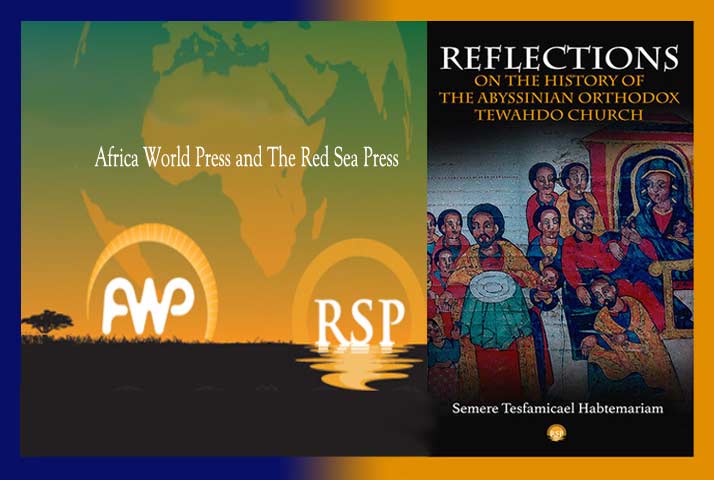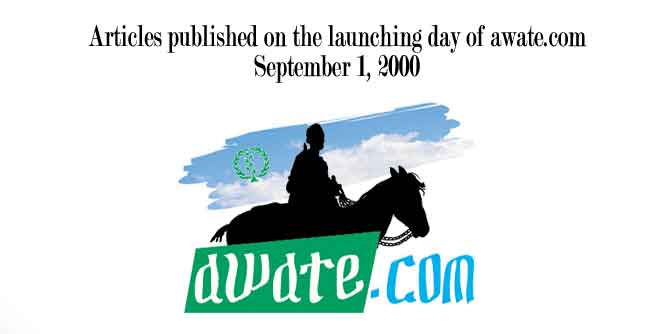The Road To NCDC: Challenges And Opportunities
 These are the main highlights of the presentation I gave in a seminar in Birmingham on 09.07. 2011. The seminar was organized by Eritrean Cultural Forum in Birmingham:
These are the main highlights of the presentation I gave in a seminar in Birmingham on 09.07. 2011. The seminar was organized by Eritrean Cultural Forum in Birmingham:
Stock assessment:
- Our basic background: What? -Will always be part of us
- How we dealt/ deal with it? -Our experience
- How does it look? Where we stand? -What have we learned/ did not learn?
- NCDC (National Conference for Democratic Change) -a means to an end
Our geographical Contrasts:
- Highland – lowland
- Plateau to Red Sea
- Landscape in Dankalia: Formidable desert, artistic volcanic rocks, ostriches
- Massawa – global gateway: Citizens of the Red Sea
- Geographical contrasts influence cultural, economic, social & political contrasts
Our social contrasts:
- Muslim / Christian /animist
- Farmer / Pastoral / traders
- Ethnicity (homogeneity /diversity
Our political contrasts:
- Local: ELF / EPLF (PFDJ)
- Region: Arab / Israeli
- Memberships in regional and international organisations
Our main problems with our contrasts:
- Denial of the other (Exclusion / Negation)
- Failure to cherish, to value, to enjoy the diversity
- We define with one perspective
- Claiming to be vanguard: I know what is good for you (elitist arrogance)
- Failure to read and understand history
- Failure to reach out to all internally & externally
- There is place only for one political organization (party), line of thought
- You agree with me 100 % or you are my enemy
- You show you are good by attacking others not highlighting your merits
History of conflict resolution:
- Culture of violence
- Resolving conflicts through force:
- ELF – ELM
- ELF – PLF
- Within ELF: ‘yemin’ ‘falol’
- Within EPLF: ‘yemin’ ‘menkae’
- Proliferation of organizations, if disagree can have ones own organization
Consequences of the defeat of the ELF and hegemony of the EPLF
- Proliferation of political organizations
- Appearance of religious and ethnic based organizations
- EPLF social engineering of tigrinization in all fields, defining ethnicity
- Sowing of strong mistrust among Eritreans to the extent of questioning living together
- Still some claim we are perfect: regime has done us no harm
Positive development in the last decade:
- ENA/EDA a positive development: a political exercise for tolerance & democratic practice though far from perfect
- A rift within EPLF/PFDJ leadership: G13, G15
- Development of civic societies in the Diaspora
- NCDC: a breakthrough in bridging differences & Bringing us together again
- Vibrant opposition media
- Exposure of regime’s brutality & self isolation & excesses
Current characteristics of our political and civic organizations
- Both are weak
- Limited in influence (constituency)
- Some have few members
- Divided by our contrasts: most dominated by ethnic, religious, regional despite national claims
- Some are not independent
- Some elitist to say the least
- Need not under- or overestimate each other
The need to work together:
- We are under very special circumstances
- We need to mobilize all resources against the brutal dictatorial regime that does not give any breathing space: urgent
- NCDC meant to do that, best possible alternative we have, if some have a better alternative present it
- Civic societies can have a positive influence on political organizations
- Can play their role from within not from outside
- Practicing democracy
- Working together widens diversity and promotes tolerance
- We will always have differences in policies, approach & processes: healthy
Towards changing the regime, we need a code of conduct:
- To respect each other’s choice of struggle
- To refrain from defaming each other
- To tolerate each other’s views
- There is no absolute truth
- Only history will show who was correct
- Talk and listen to those with different opinion
- To show one is better by focusing on own merits not on failures of opponents
How was the road to the national conference in 2010:
- There was a concerted effort by EPDP (though was part of the process) and its affiliates to foil it with ‘meskerem’ leadership (same trend again)
- To disagree OK, defame NO
- It was portrayed:
– an all Muslims conference
– An agenda of the Weyane
– Badly prepared
– Papers not discussed beforehand
- Despite all thorns, it was a success
Why the 2010 conference was a success:
- Widest peoples’ dialogue in the last 3 decades irrespective of outcome vs. ‘waelaa halibo’
- A journey of discovery & healing & understanding
- Microcosm of Eritrea: ethnic, religious, political diversity
- Bridged the gaps
- Improved trust
- Created alliance of civic and political organizations
- Laid foundation for a new relationship with Ethiopia
- Touched and discussed and agreed on all major issues
- Paved the way for a transitional phase after the fall of the regime to avoid vacuum
- Created a wide popular global movement for democratic change
- Paved the way for a wider national conference
- Gave hope to the Eritrean people & scared the regime
- Those who opposed it became even more marginalized: split of EPDP
The shortcomings of the 2010 conference:
- Translation problem: Papers & communiqué
- Logistics problem: tickets & reservations
- Financial dependency
- Some documents prepared in haste
- No input on strategy for regime change
- The papers presented were not discussed beforehand
- Ineffective use of time
- No clear cut roles of EDA & NCDC
On those who attended: how Amanuel Sahle described it
- All were there:
- The victim of Shaebia who fled to Shimelba or Mai Aini
- including the regionalist,
- the fanatic,
- the odd man out,
- the pain in the neck,
- the provocateur,
- the nihilist,
- the killjoy,
- the schizophrenic (whose mind swayed between PFDJ and the Wa’ala),
- the ELF member with a grudge in his heart,
- the painter,
- the poet, the
- singer, etc.
- All came to listen and to be heard.
On the road to the next conference: Challenges related to process & procedures
- Build trust to ensure widest participation
- Transparency
- Representation: organizations, civil societies, individuals, election of representatives
- Finance: fund raising
- Facing elite internet warriors: we only possess the truth
- Political organizations & civic organizations appreciating roles of each other
- How to deal with areas of disagreement
- Translation: need to ensure high quality
- Decisions & ownership
- Future structural organizational choices: How far we should go & clarify roles
- Need more work in Sudan & Ethiopia to ensure broader qualitative participation
- Focus on mobilizing the youth & women
- Engage actively to assist asylum seekers and refugees
- Make best use of social media and networking
- The regime is scared of any opposition gathering
- The regime will unleash a campaign spearheaded by ‘meskerem’ and its other satellites against its convening and later try to discredit the outcome
- We need to expose this and challenge it, but need to listen to genuine concerns
- Some will even attend and try to distract us from within
- There will be some in the opposition who will not attend for various reasons which is within their rights: Let us refrain from defaming them even if they do so
- Misconception & underestimation that all those who opt to attend are homogenous, have same opinion and understanding and will try enforce their views on others: far from it they are very diverse
Challenges related to issues:
- Agenda: draft transitional constitution: need & how far to go/ others
- Peaceful/all means: EDF are victim, not to be targeted
- Issues missing:
– Mechanisms & strategies of regime change
– National reconciliation (included in transitional council item 64/65 + peace & peoples interaction 70/71)
– Peace & order
- Relations with Ethiopia
- Future organizational structure
– what form
– How far
- Future role of EDA/ individual political organizations
Opportunities:
- Assert that ultimate power lies within the People of Eritrea and whatever we do or programs we suggest has to be ratified in free Eritrea
- We have the luxury of being able to express ourselves freely and we have every right to draft mechanisms, suggest roadmap or charter to facilitate smooth transfer of power
- Can mobilize all our resources for a regime change and creation of democratic country
- Can give our people hope that we stand together
- Can send a strong message to international community that we are a better alternative to the regime
- Those who become members of the transitional structure not to run for office in the first elections



Awate Forum